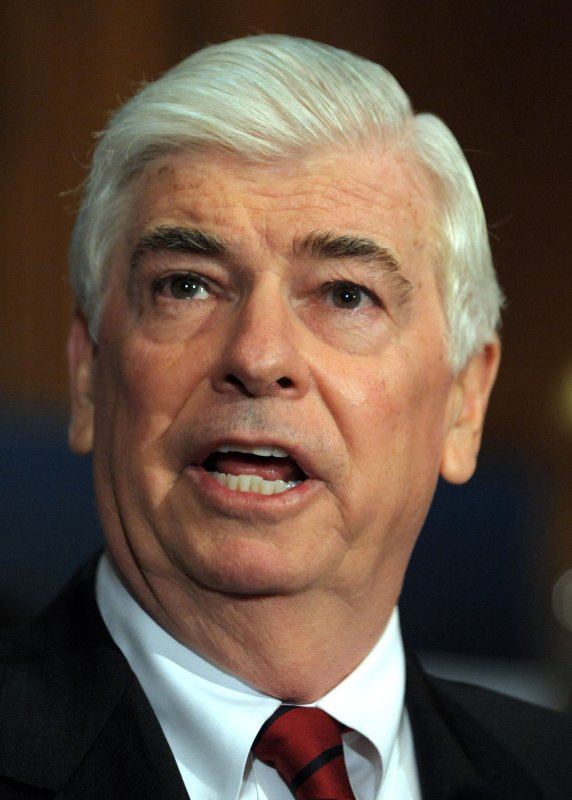U.S. Sen. Christopher Dodd, D-Conn. UPI/Roger L. Wollenberg |
License Photo
COLLEGE PARK, Md., March 16 (UPI) -- America's banks are as vulnerable today as before the credit crisis and reforms offered by Senate Finance Committee Chairman Christopher Dodd won't fix things.
Prior to the crisis, Americans spent vastly more than they earned, borrowing against overvalued homes through creative mortgages. Banks offered adjustable rate mortgages and other products that unrealistically assumed homeowners could shoulder much bigger monthly payments after five years or refinance homes at higher values. Often incomes and home values were not verified and similar games abounded on credit cards.
Many borrowers knew they faced calamity but cultivated delusions that their paychecks would miraculously increase and housing prices would perpetually rise to finance lifestyles built on fantasies more than facts.
Bankers played, because they often sold dodgy loans to big Wall Street financial houses who bundled those into bonds called collateralized debt obligations sold to unwitting investors. The latter were persuaded by the availability of credit default swaps -- insurance contracts that promised to pay if mortgages failed.
When the housing bubble burst, we learned financial firms wrote the swaps with woefully inadequate collateral to cover obligations.
Lehman Brothers, Citigroup and many other banks were caught stuck with CDOs they either failed to peddle or purchased. U.S. Treasury Secretary Henry Paulson knew large banks held CDOs in special Structured Investment Vehicles but saw no threat.
Dodd, D-Conn., proposes to fix all this with a new consumer protection agency -- to keep Americans from borrowing too much. However, the Federal Reserve, FDIC and other regulators have already put screws to the banks and loans are now much tougher to get.
The history of the U.S Congress meddling on behalf of consumers is to force banks to make imprudent loans to unqualified consumers and to charge lower fees than the resulting risks warrant.
Simply, at U.S. President Barack Obama's behest, Dodd is proposing a new agency that could undo good reforms already under way.
To keep banks, big financial houses and pesky hedge funds from mischief, Dodd also proposes a Systemic Risk Council of the chiefs of federal regulatory agencies to head off future debacles, but before the recent crisis Paulson and other regulators knew about the CDOs and SIVs and saw no danger. This council will accomplish little.
Further, to cope with the next collapse of a "too big to fail" financial house, Dodd would tax big financial firms to create a $50 billion bailout fund and federal regulators would be empowered to liquidate the firm using those funds to grease the process.
No one has done a reality check on these ideas.
Federal regulators already have that resolution power regarding Citigroup and AIG, and their bailouts required much more than $50 billion to finance. Simply, Federal regulators have found it impossible in a severe environment of deleveraging to sell off the good parts of those companies quickly to get back the taxpayers' money. It's fantasy to believe such authority would have accomplished a different outcome at Lehman Brothers.
Better discipline is required for banks and big financial houses, such as adequate collateral under swaps and better discipline on portfolio diversification.
Commercial banking -- taking deposits and making loans -- should once again be separated from other financial activities such as creating, selling and holding securities.
These would no doubt face fierce opposition from Wall Street, and the Treasury is disinclined to truly challenge J.P. Morgan and others.
Sadly, the recent crisis is sowing the seeds of an ever greater financial debacle. The Obama administration and Congress are proving simply too inadequate to the task.
--
(Peter Morici is a professor at the Smith School of Business, University of Maryland, and former chief economist at the U.S. International Trade Commission.)
--
(United Press International's "Outside View" commentaries are written by outside contributors who specialize in a variety of important issues. The views expressed do not necessarily reflect those of United Press International. In the interests of creating an open forum, original submissions are invited.)















